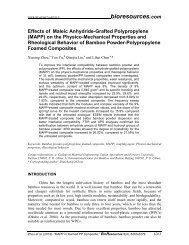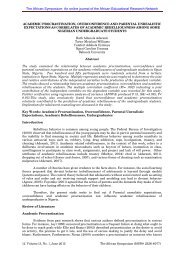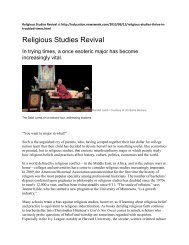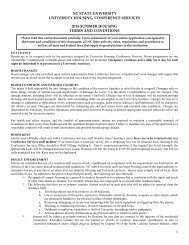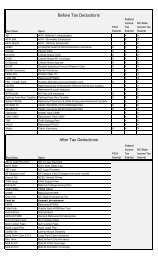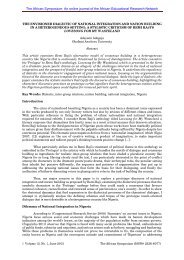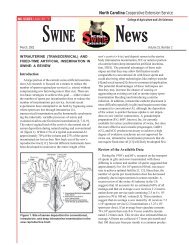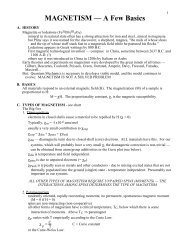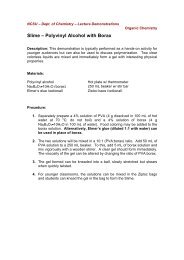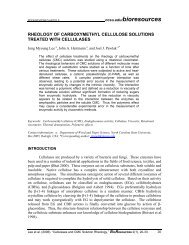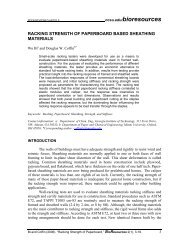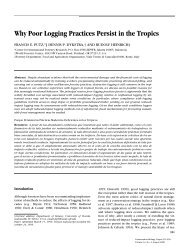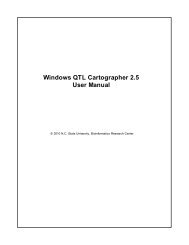HESO 253 Orienteering Course Syllabus
HESO 253 Orienteering Course Syllabus
HESO 253 Orienteering Course Syllabus
You also want an ePaper? Increase the reach of your titles
YUMPU automatically turns print PDFs into web optimized ePapers that Google loves.
<strong>HESO</strong> <strong>253</strong> <strong>Orienteering</strong><br />
<strong>Course</strong> <strong>Syllabus</strong><br />
David Conner<br />
1 Instructor Information<br />
Name:<br />
Office:<br />
Office Hours:<br />
Email:<br />
Website:<br />
David Conner<br />
2016-E Carmichael Gym<br />
Available on Google Calendar<br />
david_conner@ncsu.edu<br />
http://www.ncsu.edu/project/dac_courses/index.php<br />
2 <strong>Course</strong> Information<br />
Class Location: Carmichael Rm 2036<br />
Credit Hours:<br />
1 Hr.<br />
<strong>Course</strong> Prerequisites: None<br />
<strong>Course</strong> Corequisites: None<br />
2.1 <strong>Course</strong> Description<br />
The orienteering course focuses on navigating from defined point to defined point with the use of a<br />
compass and map in the shortest possible time. Instructional topics include the basic components<br />
and functions of a compass, general map reading skills, and various land navigation techniques.<br />
This course emphasizes the practical application of land navigation skills as applied to the sport<br />
of orienteering.<br />
2.2 Health Information Statement<br />
Physical activities in this class are considered moderate to vigorous and are considered limited<br />
contact. The NC State Department of Health and Exercise Studies supports the development<br />
and improvement of physical health, while doing so safely. If you have a known medical condition<br />
that could be adversely affected by participating in the typical activities of this class, please<br />
contact your usual physician for recommendations about how to participate safely or whether it<br />
is more appropriate to choose a different Health and Exercise Studies course. If your physician<br />
has provided you with recommendations to modify participation in this class, please share those<br />
recommendations with the instructor within the first week of class, if possible. If you are not certain<br />
whether you have a medical condition that puts you at risk for participation in this class or have<br />
1
heso <strong>253</strong> syllabus<br />
a medical condition and cannot access your usual physician in a timely manner for recommendations<br />
for safe participation, consider making an appointment at Student Health to discuss your<br />
concerns (appointment number is 919.515.7107 or book on-line at healthweb.ncsu.edu).<br />
2.3 GEP Objectives in Health and Exercise Studies<br />
Each course in the physical education category of the General Education Requirements will provide<br />
instruction and guidance that help students to:<br />
1. acquire the fundamentals of health-related fitness, encompassing cardio-respiratory and cardiovascular<br />
endurance, muscular strength and endurance, muscular flexibility and body composition;<br />
and<br />
2. apply knowledge of the fundamentals of health-related fitness toward developing, maintaining,<br />
and sustaining an active and healthy lifestyle; and<br />
3. acquire or enhance the basic motor skills and skill-related competencies, concepts, and<br />
strategies of physical activities and sport; and<br />
4. gain a thorough working knowledge, appreciation, and understanding of the spirit and rules,<br />
history, safety, and etiquette of physical activities and sport.<br />
2.4 Student Learning Outcomes<br />
The student will:<br />
• Identify the components of a compass<br />
• Develop pacing techniques and skills for use in orienteering<br />
• Identify markings, scales and landforms on an orienteering map<br />
• Explain and apply a variety of techniques in land navigation and orienteering<br />
• Apply traits of self-confidence and self-reliance in solving orienteering problems<br />
• Identify safety issues in the sport of orienteering<br />
• Compare the various fitness principles as they relate to orienteering<br />
3 <strong>Course</strong> Resources and Materials<br />
3.1 Text<br />
Online: All course materials and resources are provided online located on the Moodle course<br />
website. :FREE<br />
3.2 Equipment<br />
Compasses and maps will be provided by the Department of Health and Exercise Studies.<br />
2
heso <strong>253</strong> syllabus<br />
3.3 <strong>Course</strong> Website<br />
All course information will be available on the web using Moodle at https://wolfware.ncsu.edu. Any<br />
changes to the information located on the website will be announced via email or during class<br />
sessions.<br />
3.4 Communication<br />
Students are responsible to confirm that the email address listed in your MyPACK account is current<br />
and accurate. There may be several instances during the semester that important information<br />
will be relayed to the class via email.<br />
4 Attendance and Participation<br />
4.1 Dress<br />
Students are advised to dress appropriately for the activities in this course. Most field exercises<br />
and problems will be performed in wooded areas where a variety of hazards exist. Students should<br />
be prepared to deal with cold weather, rain, uneven and wet terrain, thick brush, briars, water<br />
crossings, and steep hills. Students who fail to dress properly may not be allowed to participate in<br />
an activity and be counted absent for the class session.<br />
4.2 Attendance Policy<br />
Students are expected to attend class. Students that attend less than 80% of a given class session<br />
may be counted absent. The university calendar dictates the first day of class. All absences from<br />
that day forward will be counted regardless of reason including late registration. Students are<br />
responsible for all assignments and materials covered during absences. Each student may have<br />
a maximum of 3 absences in the course without penalty, including excused absences, unexcused<br />
absences, religious holidays, etc. Any student with 4 or more absences will receive a failing grade<br />
for the course. For more information see Attendance in University Policy Links.<br />
4.3 Tardiness<br />
Students reporting to class after the established time will be considered tardy. Two tardies will<br />
equal one absence.<br />
5 Grading<br />
Final grades will be determined using the point distributions listed in the table below. Letter grades<br />
will be given according to the plus(+)/ minus(-) grading scale. For more information see Grading<br />
in University Policy Links.<br />
3
heso <strong>253</strong> syllabus<br />
Table 1: <strong>Orienteering</strong> Grade Criteria<br />
Assignment/Activity Points<br />
Mapping Project 5<br />
Score Problem 10<br />
Lake Johnson Problem 15<br />
Schenck Forest Problem 20<br />
Umstead Problem 25<br />
Final Exam 25<br />
Total Points 100<br />
5.1 Mapping Project<br />
Students will map a designated area on campus highlighting the contour intervals and shape of the<br />
selected area. The map should include all relevant reentrants and spurs, but should not include<br />
map features such as boulders or trails.<br />
5.2 Score Problem<br />
The score problem will take place on campus. You will not need any special equipment, but it<br />
would be avisable to wear pants and long sleeves due to the dense underbrush in the problem<br />
area.<br />
5.3 Lake Johnson Problem<br />
The Lake Johnson problem will take place off campus at Lake Johnson on Avent Ferry Rd. Students<br />
will sign up in advance for start times. Students may be required to find their own means of<br />
transportation to and from Lake Johnson. You will not need any special equipment, but it would<br />
be avisable to wear pants and long sleeves due to the dense underbrush in the problem area.<br />
Additionally, you may be required to cross small streams or wet areas.<br />
5.4 Schenck Forest & Umstead Park Problems<br />
The Schenck Forest and Umstead Park problems will take place off campus just off of Reedy Creek<br />
Rd. Students must sign up in advance for start times. These problems will take place on weekend<br />
days. Consequently, students will be required to make their own transportation arrangements to<br />
and from the problem locations. You will not need any special equipment, but it would be avisable<br />
to wear pants and long sleeves due to the dense underbrush in the problem area. Additionally,<br />
you may be required to cross small streams or wet areas.<br />
5.5 Final Exam<br />
The final exam will be a cumulative test of all material covered during the semester including<br />
classroom lectures and fieldwork.<br />
4
heso <strong>253</strong> syllabus<br />
6 Grading Policies<br />
6.1 Late Or Make-Up Assignments<br />
Any graded activity used in this course will be considered late if submitted after the due date without<br />
proper documentation for an excused reason as defined in the university academic policies.<br />
For more information see Attendance in University Policy Links. All documentation for excused<br />
absences must be submitted via email and must be verifiable by including contact information of<br />
relevant individuals. All make-up assignments must be approved by the instructor and completed<br />
within one week of returning to class. Late assignments will be penalized 10% per (week)day. Assignments<br />
more than five days late will not be accepted. However, make-ups for online activities,<br />
such as lessons, quizzes and exams, which are accessible for multiple days will not be permitted.<br />
6.2 Grading Methods<br />
Students are responsible for selecting the grading method that best fulfills their academic goals for<br />
this course. It is highly recommended that students confirm with their academic advisor that this<br />
course can be taken with any grading method other than a letter grade. The last day to drop this<br />
course or change the grading method is available on the Academic Calendar on the Registration<br />
and Records website. For more information see Registration and Records in University Policy<br />
Links. All requests for grading method changes by the course instructor after those published<br />
dates will be denied.<br />
6.2.1 Grading Scale<br />
Each student has the option of taking the class for a letter grade(+/-), credit only, or audit.<br />
A+ = 100–97 B+ = 89.99–87 C+ = 79.99–77 D+ = 69.99–67 F = 59.99–0<br />
A = 96.99–93 B = 86.99–83 C = 76.99–73 D = 66.99–63<br />
A- = 92.99–90 B- = 82.99–80 C- = 72.99–70 D- = 62.99–60<br />
6.2.2 Credit-Only<br />
Students who are taking this course as credit-only must score 70%or higher on all work combined<br />
to receive a Satisfactory (S) grade.Otherwise a grade of Unsatisfactory (U) will be given. Students<br />
are strongly advised to confirm their grading status for this course with Registration & Records.<br />
If you have questions concerning the appropriate grading status please refer to your academic<br />
advisor. For more information see Grading in University Policy Links.<br />
6.2.3 Audit<br />
Audit students must score at least 70% on all work combined to receive a grade of "AU" for this<br />
course, otherwise a grade of "NR" is given. Audit students are exempt from the course<br />
attendance policy. For more information see Grading in University Policy Links.<br />
5
heso <strong>253</strong> syllabus<br />
6.3 Incomplete Grades<br />
Incomplete grades will be assigned only if unavoidable and unforeseen events occur, such as a<br />
medical emergency, preventing the student from completing a course requirement before the final<br />
grades are submitted. Incomplete grades are not a substitute for subpar academic performance<br />
in this course. Incompletes must be made up before the end of the next regular semester in<br />
which the student is enrolled. Incomplete work is to be limited to accomplishing the work not<br />
completed. It is the student’s responsibility to contact the course instructor in a timely manner to<br />
complete any work required in the subsequent semester. For more information see Grading<br />
in University Policy Links.<br />
7 General Information<br />
7.1 Academic Integrity<br />
Students are expected to work within the letter and spirit of the NCSU Code of Student Conduct.<br />
For more information see Student Conduct in University Policy Links.<br />
7.2 Physical Contact<br />
At times the instructor may assist students with certain exercises or tests. If you feel uncomfortable<br />
being touched, please let the instructor know.<br />
7.3 Participation<br />
If for any reason you cannot fully participate in a given activity on a temporary basis (max. 2 class<br />
sessions) please let me know. Reasonable accommodations will be made when possible to allow<br />
students to perform comparable activities to fulfill course objectives.<br />
7.4 Students With Disabilities<br />
Reasonable accommodations will be made for students with verifiable disabilities. Please register<br />
with the Disability Services Office(DSO). For more information see Disability Services in University<br />
Policy Links.<br />
7.5 Diversity Policy<br />
For more information see Discrimination in University Policy Links to view the University’s policy<br />
on diversity<br />
7.6 Credit By Examination<br />
Students must adhere to all university academic policies and regulations related to credit by examination.<br />
For more information see Credit By Exam in University Policy Links<br />
6
heso <strong>253</strong> syllabus<br />
8 Class Schedule<br />
Topic Description Location<br />
1 <strong>Course</strong> Introduction CG 2036<br />
2 Pace Count (100’)/Compass <strong>Course</strong> CG 2036<br />
3 Lecture: O–Maps CG 2036<br />
4 Lecture: O–Features CG 2036<br />
5 Lecture: O–Techniques/Practice <strong>Course</strong> CG 2036<br />
6 Map Project Due/Review lectures/Score-O CG 2036<br />
7 Centennial Campus <strong>Course</strong> CG 2036<br />
8 Prep for Lake Johnson CG 2036<br />
9 LJ <strong>Course</strong> Lake Johnson<br />
10 Review LJ/Prep for SF CG 2036<br />
11 SF <strong>Course</strong>s Schenck Forest<br />
12 Prep for UP <strong>Course</strong>s/Review for Exam CG 2036<br />
13 UP <strong>Course</strong>s UP Reedy Creek Entrance<br />
14 Final Exam CG 2036<br />
7
heso <strong>253</strong> syllabus<br />
9 University Policy Links<br />
• Student Conduct–“http://studentconduct.ncsu.edu/policies-and-procedures”<br />
• Grading–“http://www.ncsu.edu/grad/handbook/sections/3.18-grades.html”<br />
• Attendance–“http://policies.ncsu.edu/regulation/reg-02-20-03”<br />
• Disability Services–“http://www.ncsu.edu/dso/”<br />
• Discrimination–“http://policies.ncsu.edu/policy/pol-04-25-05”<br />
• Credit By Exam–“http://policies.ncsu.edu/regulation/reg-02-50-01”<br />
• Registration and Records–“http://www.ncsu.edu/registrar/”<br />
8



